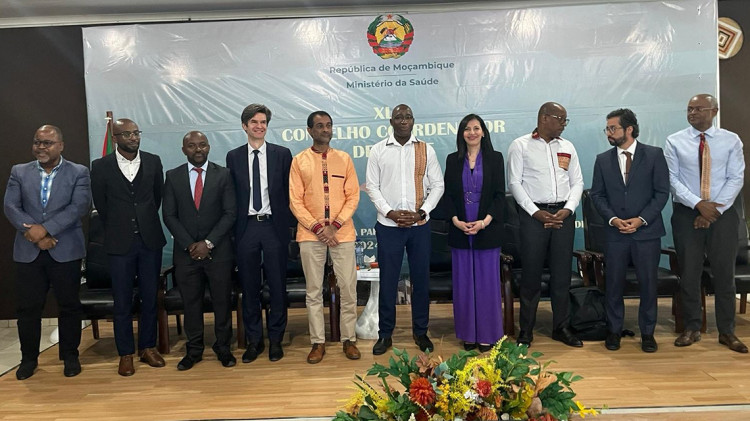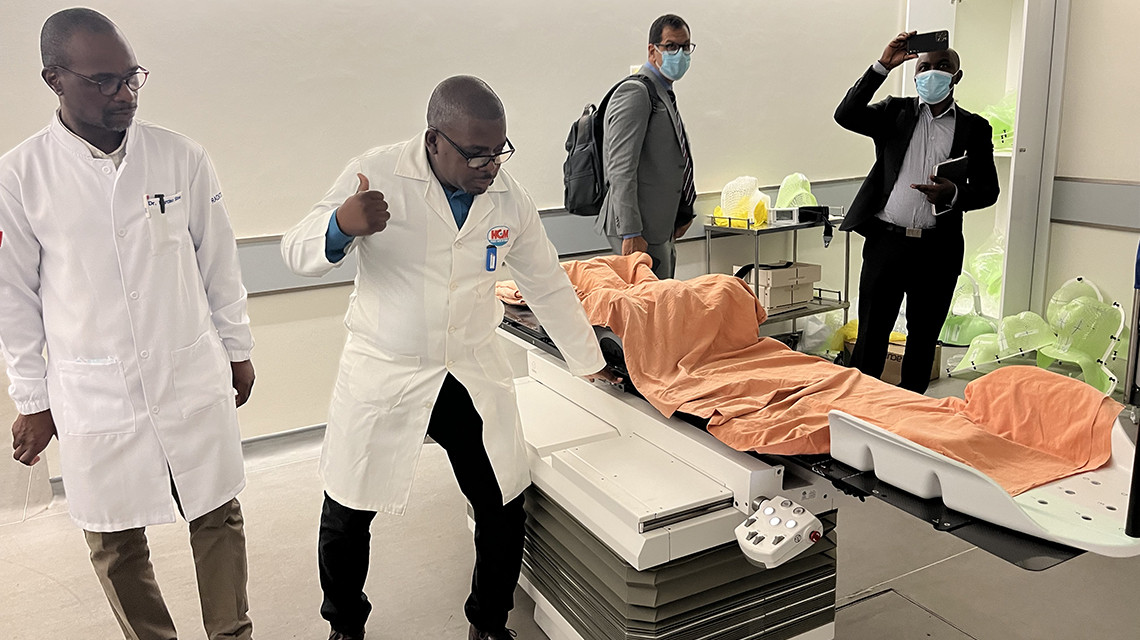The sub-Saharan African country of Mozambique is currently experiencing a high burden of infectious disease coupled with a growing burden of non-communicable diseases including cancer. To address this challenge, the IAEA, the World Health Organization (WHO), MD Anderson Cancer Center and the International Agency for Research on Cancer (IARC) sent a team of experts to the country in May to carry out a comprehensive imPACT Review of the country's existing National Cancer Control Programme, at the request of Mozambique's government. Cancers affecting women and children were high on the agenda of the review.
"The rising numbers of cancer cases in Mozambique is of great concern and the Government is taking action to expand access to diagnosis and treatment, as well as further integration of cancer services within the primary health system," said Armindo Tiago, Mozambique's Minister of Health.
According to IARC's GLOBOCAN estimates, more than 26 000 cancer cases are diagnosed annually in Mozambique, with cervical cancer accounting for a third of all cancers among women. The number of Mozambicans with cancer is expected to more than double from current levels by 2045.
The Government of Mozambique set up a ten-year National Cancer Control Programme in 2019 following a previous imPACT review in 2014. It is also in the process of developing a cancer investment plan with support from WHO.
Severin von Xylander from Mozambique's WHO Country Office said: "We are working closely with the National Cancer Control Programme in Mozambique to prioritize the prevention and early detection of cancers affecting women and children in line with the respective global cancer control initiatives."

The Minister of Health of Mozambique Armindo Tiago with members of the ImPACT Review Team in Nacala, Mozambique during the debrief session on the preliminary observations and conclusions.
The imPACT Review experts carried out a comprehensive assessment of Mozambique's capacities and needs across the continuum of cancer care. This involved data gathering and analysis before a week long mission in Mozambique in May where the team visited the Ministry of Health, hospitals, health centres, universities, United Nations partners and civil society organizations in Maputo and Nampula.
Many of the international experts participating in the mission came from the African region (Ghana, Kenya and Cape Verde) or Brazil, underscoring the importance of South-South cooperation in addressing regional health priorities. Experts from Portugal and the United States of America also participated in the mission. Connections between these countries are expected to continue beyond the imPACT Review mission, as locations in Brazil are already used as training sites for the expanding oncology workforce of Mozambique. The MD Anderson Cancer Center has a long-standing collaboration with Mozambique and during the mission, the MDACC expert provided insight and expressed their intention to further strengthen cooperation with the country.
Toma Omofoye, the Director of Breast Imaging Global Oncology Program at MD Anderson Cancer Center who participated in the imPACT mission, said: "For many years, we have been collaborating with Mozambican leaders and providers in advancing cancer care, and this impact review process is a critical step in our mission to eliminate cancer. Every insight we gain and every initiative that is implemented has the potential to elevate patient outcomes and reshape cancer care on a global scale."

The imPACT Review Team are shown around at Maputo Central Hospital.
At the end of the week, the imPACT Review team presented their key recommendations to the Ministry of Health. These included the need to further integrate and coordinate cancer services with HIV-AIDS, child and maternal health and primary care programmes; strengthen the procurement and supply chain for drugs used in chemotherapy and palliative care; increase training; optimize current diagnostic and treatment capacity; and improve cancer care referral pathways. In addition, the government was advised to strengthen quality assurance and quality control systems in line with international standards and guidelines covering diagnostics and treatment.
Last year, Mozambique joined the IAEA's Rays of Hope initiative with the aim of widening access to cancer diagnostic and treatment services across the country. At present, one radiotherapy unit in Maputo is available for 29 million people. Since 2009,14 specialists at Maputo Central Hospital have been trained in radiation oncology and medical physics through the IAEA's technical cooperation programme, with the aim of strengthening radiotherapy services.

Experts from the imPACT Review Team also visited Nampula Central Hospital.
From health to agriculture
The review mission also provided an opportunity for an IAEA radiation safety expert to assess the regulatory infrastructure in Mozambique for ensuring the safe use of ionizing radiation in healthcare. Also, during the mission, the IAEA presented the IAEA's technical cooperation programme beyond cancer to national authorities, explaining how the country can benefit from IAEA support in agriculture and fisheries and in combatting zoonotic diseases. Agriculture is the main economic activity in Mozambique according to the World Bank. Earlier this year, the World Bank announced a US $100 million grant for a four-year programme aimed at improving healthcare and nutrition services for around 4.6 million people in Mozambique, especially women, children and adolescents.
Imen Bentouhami, IAEA Programme Management Officer for Mozambique, said: "This mission was crucial for informing decision-making regarding priority needs and optimizing the use of IAEA support. Synergies within the technical cooperation programme will direct IAEA support towards these priority needs, ensuring the most cost-effective use of available resources."






